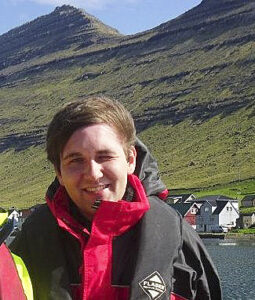Lumpfish with personality

Lumpfish are deployed into salmon farms to help control outbreaks of sea lice, but just how effective these cleaner fish are in preventing parasites from infecting salmon is a matter of ongoing debate.
While research has found salmon from cages stocked with lumpfish have infection rates 60–100% times lower than salmon from cages without lumpfish, dietary analysis has revealed that the vast majority of lumpfish in cages do not eat sea lice. Furthermore, recent reviews have criticised the high level of variation in parasite control between farms stocked with cleaner fish and note that behavioural interactions between lumpfish and salmon are very rarely documented. Understanding this high variation in cleaning behaviour may help unlock the full potential of lumpfish as cleaner fish, leading to more sustainable and efficient methods of controlling sea lice in aquaculture.
There are many reasons why some lumpfish might be better suited to cleaning salmon than others. Genetic background, health and welfare, and the environment in which fish are raised are all thought to contribute towards the behaviour of cleaner fish in farms. However, differences in the psychology of individuals may be an overlooked factor influencing variation in cleaner fish performance.
Researchers from the Centre for Sustainable Aquatic Research at Swansea University developed a series of behavioural tests to measure personality differences across a cohort of lumpfish. This included tests to record activity levels, how individuals coped with stress, their willingness to take risks and aggression levels, and to compare how social each individual was within the cohort. Tests were repeated twice to check that behavioural responses were consistent and the scores were then used to build an individual personality profile for each lumpfish.
The lumpfish were then introduced into a tank containing 10 Atlantic salmon smolts and an observer watched to record how the two species interacted. These interactions included co-operative behaviours that would be beneficial for cleaning in a farm environment, such as lumpfish moving closer to visually inspect salmon. Antagonistic behaviours were also recorded to give context on interactions that are not desirable in farms – for example, lumpfish causing salmon to flee.
The results showed that a majority of lumpfish ignored salmon. However, individuals that scored higher for “bold and non-aggressive” personality traits spent longer time periods engaging in co-operative behaviours, while individuals that scored higher for “active and social” personality traits displayed more antagonistic behaviour. This suggests that the individual personality of a lumpfish affects how it will interact with salmon, and therefore how effective it will be at removing sea lice.
These findings may account for the high variation detected by previous studies in sea lice consumption and cleaning efficiency of lumpfish. Perhaps only a small number of individuals are cleaning sea lice from salmon and therefore they have a disproportionate effect on parasite control in farms. These personality tests provide a tool for identifying productive individuals and give insight into the psychology of theseso-called “elite” lumpfish.
However, the research also raises two important questions: how can the efficiency of elite lumpfish be harnessed in farms, and what can be done with the non-cleaning individuals?
What makes a good cleaner fish?
Ongoing research collaboration between the University of Guelph and Fisheries and Oceans Canada aim to adapt these new personality tests for a commercial scale, screening behaviour of greater numbers of lumpfish at faster rates than has previously been possible. Not only will this help identify elite lumpfish to be deployed into Canadian salmon farms, but genetic research on the heritability of these behavioural traits might inform selective breeding programmes to domesticate lumpfish stocks.
Results from the Canadian lumpfish can also be compared to the British study to assess whether behavioural differences exist between distinct geographic populations across the Atlantic.
It is estimated that more than 50 million lumpfish are produced by hatcheries each year, yet mounting evidence suggests the majority of these are not effective cleaner fish. Further research is needed to better understand why so many individuals do not clean and what steps can be taken to improve their productivity in farms. For example, will raising lumpfish with new diets, tank enrichment or environmental conditions affect their personality and therefore cleaning ability? Could elite cleaners be used as teaching aids to demonstrate desired behaviours to their non-cleaning counterparts? Will non-cleaners feed on net bio-foul and thereby help maintain farm equipment?
It is hoped that by further developing behavioural tools, research can empower hatcheries to produce higher-quality cleaner fish and reduce the need for production in mass quantities. Not only would this be more economic and sustainable for the industry, but it will help create conditions that benefit the health and welfare of cleaner fish and salmon alike.
Aquaculture research has traditionally focused on fish physiology in order to maximise growth rates and increase yields, but this study demonstrates that shifting perspective to focus on fish psychology may provide new avenues for improvement and success.
Ben Whittaker is a Postdoctoral Fellow at the Department of Integrative Biology, University of Guelph, Canada.
Details of the research can be found online in Applied Animal Behaviour Science, October 2021 (“Personality profiling may help select better cleaner fish for sea-lice control in salmon farming”, Benjamin Alexander Whittaker, Sofia Consuegra and Carlos Garcia de Leaniz).


